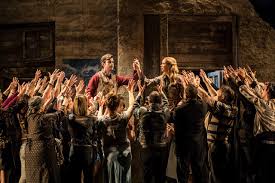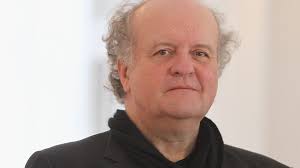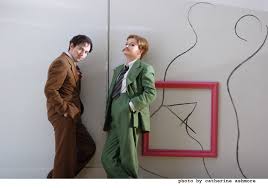|
Today, 28 February 2017, English National Opera (ENO) is pleased to announce that Sally Burgess is joining the ENO Board of Trustees with immediate effect. Highly acclaimed mezzo soprano Sally Burgess began her long and renowned relationship with ENO in 1978 as Zerlina (Don Giovanni). She has since returned to perform over 40 roles with the company, the most notable being Carmen, Octavian (Rosenkavalier) and Judith (Bluebeard’s Castle). Her distinguished career includes performances at most of the world’s major opera houses, including The Metropolitan Opera, New York; Bayerisches Staatsoper, Munich; Opera National de Bastille, Paris; The Royal Opera House, Covent Garden; and Houston Grand Opera. On the concert platform she has collaborated with many eminent conductors including Sir Mark Elder, Sir Charles Mackerras and Daniel Barenboim. Sally is Vocal Professor at the Royal College of Music and Professor at the Guildhall School of Music and Drama. She is an internationally sought after teacher of voice and stagecraft and leads masterclasses, workshops, competitions and regularly directs opera scenes across Europe, Russia and South Africa. In 2011 she was made a Fellow of the Royal College of Music (FRCM). Commenting on the appointment, ENO Chair, Dr Harry Brunjes says, ‘I am delighted that Sally Burgess has kindly accepted our invitation to join the board. As a company we will all benefit enormously from Sally’s expertise and experience. It will be a privilege to work alongside a singer and a performer with such a deserved reputation in the opera world.’ ENO Artistic Director Daniel Kramer commented, ‘I am thrilled to welcome Sally back to ENO, and certain that she will be a huge asset to our Board. She brings with her a deep understanding of the company, its history and its values to support the artistic team with long-term strategy and planning.’ ENO’s Chief Executive, Cressida Pollock said, ‘We are all looking forward to working with Sally, and to the numerous ways in which her significant creative expertise and experience, alongside her passion for the company, will strengthen ENO’s Board.’ Sally Burgess commented: ‘I am delighted to join the Board of English National Opera, and I look forward to contributing insights gained from my experience as both a performer and a vocal specialist. ENO is a company I have performed over 40 roles with, and so I know first-hand how wonderful it is to work alongside their award winning Orchestra and Chorus as well as their exceptional production and technical teams.’ |
Monthly Archives: February 2017
ENO: The Winter’s Tale
London Coliseum, Monday 27 February 2017
When the RSC stages The Winter’s Tale it normally runs over three hours. Ryan Wigglesworth’s new opera based on the play runs for under two hours, so we are immediately aware that this is going to be a highly focused, not to say intense, adaptation of the play – and so it proves to be. Gone are the comic characters, all of the songs and incidental music, dancing is reduced to a brief aside. The focus is entirely on the impact of jealousy in both Leontes and Polixenes.
Vicki Mortimer’s high walled setting constantly encloses and cuts off the characters from each other, and placing both Sicilia and Bohemia under military rule gives little sense of contrast in the second act. If anything, the music underlines the unifying factors rather than the differences between the two countries.
The conclusion moves away from Shakespeare. Though Hermione returns to life there is little sense of resurrection or restoration here, and the final image is uncomfortably spectral, as the dead Mamillius wanders slowly off stage.
Ryan Wigglesworth’s score mirrors this intensity of approach with music that is frequently edgy and uncomfortable. There are few lyrical moments, even in Bohemia, and characters rarely reflect on their positions, though Iain Paterson’s finely drawn Leontes is allowed two more-extended introspective moments.
Sophie Bevan makes what she can of Hermione though the trial scene gives her nowhere near enough emotional scope for us to empathise more than at the most superficial level. Samantha Price makes more impact as Perdita though sixteen years living rurally is glossed over.
The concentration of the text makes Polixenes a more important protagonist, strongly sung by Leigh Melrose. His – spoken – assault on Florizel becomes one of the strongest moments of the evening, drawing parallels with the first act in an almost identical setting.
Smaller parts are well rounded but the most interesting musical innovation comes with the chorus. There is, of course, no chorus in Shakespeare. Verdi had to interpolate choruses into his settings and Wigglesworth does the same. They are very effective, particularly the protest for Hermione, which has no place in the original but here reflects current political unease very succinctly.
Rory Kinnear’s production is masterly in its understatement and naturalism. Even in moments of high tension he manages to maintain a convincing sense of normality taken to the edge. He brings all his experience of working in the theatre to ensure that even the most unlikely events convince and that emotions are always credible. It is a remarkable debut and he will surely be asked again – and soon!
SUSSEX ALIVE
Saturday 4 March 2017 7.45 p.m.
St Michael’s Church, Lewes High Street
Directed by Andrew Sherwood
Bach Goes to Sussex
Bach – Brandenburg Concerto No.3
Peter Copley – Tango
Robin Milford – Concertino for piano and strings in E Major, Op.106
Fishing by Moonlight for piano and strings
Soloist Margaret Fingerhut
Bartók – Divertimento for String Orchestra
7.10 p.m. Pre-concert talk
Peter Copley discusses tonight’s music
GARSINGTON OPERA AND COASTAL CULTURE NETWORK
As a result of Magna Vitae and Garsington Opera for All’s pioneering education and outreach work integrated with free public screenings of opera in isolated coastal and rural communities, a new online network – the Coastal Culture Network (CCN) – has been formed. CCN aims to strengthen the network of cultural provision around the coast by bringing together coastal local authorities, cultural organisations, Coastal Community Teams and others with an interest in the role of culture in seaside locations.
Culture and the coast are inextricably linked. Always part of the English seaside attractions, in recent years contemporary arts and culture have helped to reinvigorate many coastal towns following the decline of traditional tourism. The potential of culture to be a key factor for regeneration is now widely acknowledged and the CCN aims to build on this and drive it forward. Projects such as Opera for All feed into the process by raising confidence and aspiration and impacting on community cohesion.
Opera for All was set up by Garsington Opera, Magna Vitae and the Coastal Communities Alliance in 2015 after a successful bid made to Arts Council England for funding, which enables a large-scale programme of education and outreach work in isolated and rural coastal communities together with free digital screenings of a performance from Garsington Opera to be run. For a period of three years, this has provided ground-breaking opportunities for communities to be involved in creating, learning about and performing opera.
Projects and free screenings will again take place this year in Skegness, Ramsgate, Highbury/Burnham–on-Sea and Grimsby and over 1000 young people will take part in creative residencies at both primary and secondary schools. For the students in each of the 25 schools, the experience of working alongside a team of professional artists to create and perform their own pieces in relation to the opera that will be screened (Semele 2017, Eugene Onegin 2016, Così fan tutte 2015) is transformative. For many, it is their first experience of live professional singing and it sets confidence and aspirations soaring. The programme challenges expectation by uncovering the ingredients and foundation of opera – drama, music, story-telling and expressive emotion.
The CCN can be found within the Coastal Communities Alliance website. Members will be able to join an online forum, communicate with other members to build partnerships, and access case studies, information and resources. These functions will go live March 2017.
OXFORD LIEDER 2017
Gustav Mahler and fin-de-siècle Vienna will be the focus of the Oxford Lieder Festival (13-28 October 2017), exploring his influences, contemporaries and legacy. Mahler was a dominant musical personality: composer and preeminent conductor, steeped in tradition but a champion of the new. During this Festival, his complete songs with piano will be heard, inviting a fresh look at this ’symphonic’ composer and the enduring place of song in the musical landscape. His choices of texts, wider artistic influences from literature to art to nature and folk music, his Jewish background in a conservative Catholic city, his encounter with Freud, his encouragement of other composers and more will all be explored over the fortnight.
Mahler’s Vienna will also be placed in a wider context, with tradition represented in the songs of Schubert and Beethoven, an exploration of Brahms’ glorious melodic gifts, an in-depth look at Richard Strauss, and music by Hugo Wolf, Alexander Zemlinsky, Erich Korngold, Joseph Marx and others. A late-night salon will look ahead to the Second Viennese School, including several of Schoenberg’s seminal works. Study days, readings, screenings, workshops and more once again make for an exhilarating Festival that will illuminate the era.
Some of the world’s leading singers and instrumentalists will take part, including Ian Bostridge, Sarah Connolly, Katarina Karnéus, Angelika Kirchschlager, Mark Padmore, Roderick Williams, Imogen Cooper, the Doric String Quartet and members of the Orchestra of the Age of Enlightenment.
Passes will be on sale from 1 March from www.oxfordlieder.co.uk / 01865 591276.
Full Passes: £600/£510. One-week Passes: £400/£340.
General booking opens 1 June 2017
The Loves of Mars and Venus
The Weaver Dance Company with Barefoot Opera
St Mary in the Castle, Hastings, Sunday 26 February 2017
John Weaver is not a familiar name even to ballet enthusiasts but he is credited with creating the first modern narrative ballet for Drury Lane Theatre, three hundred years ago, in 1717. To celebrate this event, Barefoot Opera have combined forces with The Weaver Dance Company to recreate that occasion. In the early eighteenth century ballet was little more than an additional entertainment, or a filler between more exotic theatrical presentations, but Weaver brought together the enthusiasm and style of the French with the more popular approach of English dance to tell the familiar story of Venus and Mars.
However, there is a basic problem. Weaver wrote about the project in great detail but left behind neither the music nor the choreography, which has had to be skilfully recreated. Evelyn Nallen undertook the research on the score, devising a piece based on incidental music to plays of the early Georgian period, and Gilles Poirier recreated the choreography. All of this painstaking work came to fruition at St Mary in the Castle last Sunday evening.
When we eventually got to see the piece it was charmingly done, with Romain Arreghini a magnificently elegant Mars – mirroring the images of Louis XIV in full flow – and Chiara Vinci a gently coquettish Venus.
The trio of recorder, lute and cello made a fine sound within the welcoming acoustic of St Mary’s and it was good to hear the arrangement from Handel’s Water Music at the start of the evening.
All of the above would have been excellent in itself but there was a major problem in the organisation of the evening as a whole. The Loves of Mars and Venus lasts scarcely half-an-hour. How to make it into an evening’s entertainment? Billed simply as a ballet, we were expecting just that but in the event the presentation spent far longer giving us the historical background than it did the ballet itself. Added to this, the failure to provide any adequate PA system meant that the majority of what was said for the first thirty-five minutes went unheard. Jenny Miller came to the rescue and gave us a precis of the text from the two speakers but this was not, unfortunately, the end.
Instead of the ballet starting at this point we had yet another acted introduction from John Weaver himself. In the event we had three introductions lasting almost an hour before a performance of less than half!
This was a pity, as the quality of the music and dance was not in question, and the research involved was fully justified. John Weaver deserves the credit for what he created, but he equally deserves a more professional approach than he got on this occasion.
ENO: The Pirates of Penzance
London Coliseum, 23 February 2017
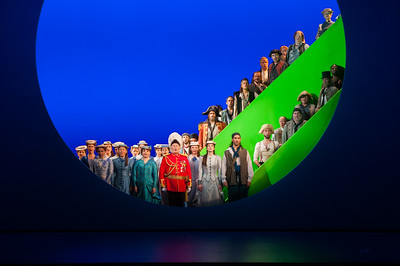
Andrew Shore as the Major General in the Pirates of Penzance, performed by the English National Opera. 7th Feb 2017, London Coliseum, Britain.
Fifty years ago every local operatic society relied on Gilbert & Sullivan for their daily bread. Today it is difficult to find individual performances which may account for the high levels of surprise and delight in the audience enjoying this first revival of Mike Leigh’s production.
By taking the work at face value – no knowing asides or updating – the comedy actually works far better, and, sung by operatic voices, the music holds its own with ease.
The casting was different enough to make for an interesting evening even for those of us who had greatly enjoyed the original outing in 2015. David Webb has a light lyric tenor which he uses intelligently as Frederic, and his slightly reserved presence is perfectly in character. Soraya Mafi by contrast is a highly excitable Mabel but one for whom the Bellinian coloratura holds no terrors. Their duet Ah leave me not to pine was genuinely moving. Ashley Riches is a wonderful cardboard cut-out as the Pirate King, all swagger and attitude, and is surrounded by a likeable group of cut-throats.
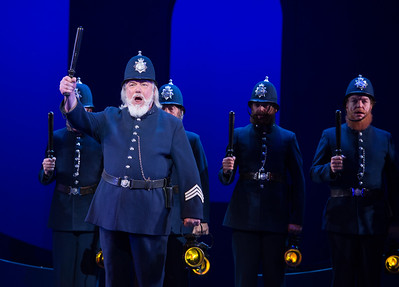
John Tomlinson as the Sergeant of the Police in the Pirates of Penzance, performed by the English National Opera. 7th Feb 2017, London Coliseum, Britain.
To have the finest Wotan of his generation as the Sergeant of Police was a gem, and John Tomlinson did not disappoint. Totally in character, as one would expect, his nuances with the text were constantly alive and apt, and his voice, needless to say, better than one would dare to expect.
Lucy Schaufer returned as a sympathetic Ruth and Andrew Shore again relished the part of the Major General.
Gareth Jones moved things along swiftly in the pit and it was good yet again to enjoy Sullivan’s score from a full orchestra not a pit band.
BBC Symphony Orchestra
Barbican Hall, Wednesday 22 February 2017
The UK premiere of Wolfgang Rihm’s Piano Concerto No2 may have accounted for the rather thin audience but those who stayed away missed one of the finest Bruckner performances I can recall in many years.
Rihm’s work fluctuates between tonal and atonal sentiments meaning that the ear is never quite at ease with the developmental line. There are many quasi-lyrical passages, and the gentler sections often come close to moving the listener but then the underlying tension works against this. The snare-drum towards the end brings a rare moment of consolidation to a work which can seem to be drifting away from us. The piano part is fiercely demanding with hardly a moment of respite for the soloist. In this capacity Nicolas Hodges was a tireless enthusiast and at times came close to convincing us that the work was greater than the sum of its parts. Lothar Koenigs brought sensitivity to many passages but could do little to enthuse us about the whole.
Bruckner’s Seventh Symphony after the interval was another matter altogether. There was superb dynamic range and consistent sensitivity towards the clarity of the score. The second movement had an Elgarian opacity which I can’t recall ever being aware of before. It was full of light and joy, with no sense of the ponderous weight that so many bring to Bruckner. The drive and enthusiasm in the Scherzo was matched by an almost playful approach to the finale.
Thankfully, being a BBC performance, it will be broadcast on Tuesday 28 February and I for one will be listening again.
St. Nicolas Pevensey secures Heritage Lottery Funding
St Nicolas Church, which celebrated its 800th anniversary in 2016, has been awarded £74,900 by the Heritage Lottery Fund. This grant, together with church generated funds, will pay for a programme of improvements that will ensure repairs to the roof and rusted windows, and a new electrical wiring and lighting system. These will be the latest elements of a restoration programme begun in 2006, which protected the church building from the prevailing south-westerly Channel winds and storms. The next and final stage aims to repair internal rendering and finishing, which has been extensively damaged as a result of incoming damp.
As well as keeping the congregation warm and dry, the improvements will mean the church’s many visitors and the audiences to St Nicolas’ burgeoning concert programme will also be able to enjoy the church in much greater comfort.
The grant will also pay for the installation of a landmark display that describes the role of the church over eight centuries from the time when Pevensey was an important medieval seaport. An overall narrative for the church is condensed into a series of six main storylines, embraced by one overarching theme: “For eight centuries the Church of St Nicolas, patron saint of seafarers, has kept watch over Pevensey, reflecting the town’s fortunes and inspiring its community.” This will be unveiled on completion of the project in 2017.
Welcoming the announcement, Deputy Churchwarden and outgoing leader of the P16 fund raising group, George Stephens said: “The church has been on the Heritage at Risk Register for some time, and could well have had to close permanently if this application had not been successful. Having celebrated the church’s 800th anniversary throughout 2016, this grant means the church will remain for use by the community and churchgoers for many years to come.”
ENO: Partenope
Christopher Alden’s Olivier Award-winning production of Partenope returns to ENO starring Sarah Tynan
Opens Wednesday 15 March at 7pm at the London Coliseum (5 performances)
One of the most celebrated new productions of Handel’s work in the last decade will return to ENO in March, with the original partnership of Christopher Alden and Christian Curnyn resuming their roles as Director and Conductor respectively. Called ‘riveting’ byThe Guardian and ’superb’ by The Sunday Telegraph in a five-star review, the original run won the 2009 Olivier Award for Best New Opera Production.
One of Handel’s outstanding comic works, the tale of Queen Partenope and her three suitors features cross-dressing, mistaken identity and the crazed politics of romance. In Alden’s production, which has also been seen to great acclaim at the Sydney Opera House and the San Francisco War Memorial Opera House since its London premiere, the action is relocated from mythical ancient Naples to the salons and drawing rooms of the socialite set of twenties Paris, with design inspired by the surrealist photography of Man Ray.
The production will feature an outstanding cast showcasing some of the best British singers at work today, led by Sarah Tynan (’some of the finest baroque singing you’ll hear anywhere’ – The Guardian) in the title role. Sarah’s previous Handel roles at ENO include a ’superbly beautiful’ (Opera Today) Romilda in the 2014 performances of Xerxes, with Marzelline in 2013’s Fidelio and Zerlina in 2012’s Don Giovanni being other highlights. This marks her role debut.
Mezzo soprano Patricia Bardon will sing Queen Partenope’s dashing suitor Arsace. Patricia most recently sang at ENO in 2014 as Mary Magdalene in The Gospel According to the Other Mary, described as ’the performance of her life’ by The Guardian. Her strength as a Handelian has been praised, giving an ’utterly melting’ (New York Times) performance as Zenobia in The English Concert’s 2013Radamisto.
Countertenor James Laing sings as the shy suitor Armindo. James has previously appeared at ENO as Nireno in Julius Caesar in 2012. He has sung Handel’s operas on numerous other occasions, including as Tirinto in Imeneo for the 2016 Göttingen International Handel Festival and as Medoro for Welsh National Opera’s 2015 Orlando.
Returning ENO favourite Robert Murray sings Emilio, the suitor warring for the Queen’s hand. In addition to his starring roles here inThe Pirates of Penzance and The Mikado, his singing of Handel in Acis e Galatea at Wigmore Hall in 2013 was called ’splendid’ by TheObserver. Rosmira, the former lover of Arsace in disguise as the male Eurimene, is sung by Stephanie Windsor Lewis, who debuted at ENO last year as Suzuki in Anthony Minghella’s production of Madam Butterfly. The cast is completed by ENO Harewood Artist Matthew Durkan as Ormonte.
Conductor Christian Curnyn is well-known as one of baroque’s foremost interpreters in the UK: ’Find anything exciting happening in period opera in the UK and Curnyn will be involved’ (The Spectator). He founded the Early Opera Company in 1994 in order to champion the relevance of baroque opera, and has won great acclaim for his recordings and performances in the area since. His most recent Handel conducting at ENO, for 2014’s Rodelinda, was called ’well-nigh flawless’ by The Guardian.
Christopher Alden has directed numerous ENO productions across the years including Norma and The Makropulos Case. He has directed operas across the world, long known for his challenging and innovative concepts. On top of winning the 2009 Olivier Award for Best New Opera, this production of Partenope won the 2011 Helpmann award for Best Opera in Australia.
The design team of Andrew Lieberman (set) Jon Morrell (costume) and Adam Silverman (lighting) provide the striking surrealist look while the witty English translation is by Amanda Holden.
Partenope opens on Wednesday 15 March 2017 at 7.30pm for 5 performances – 17, 20, 22, 24 March.


